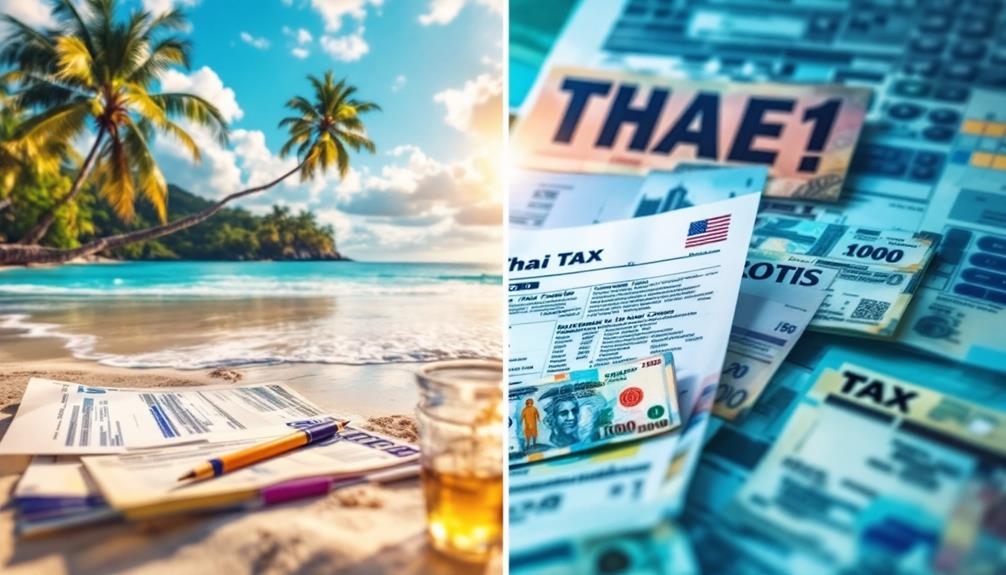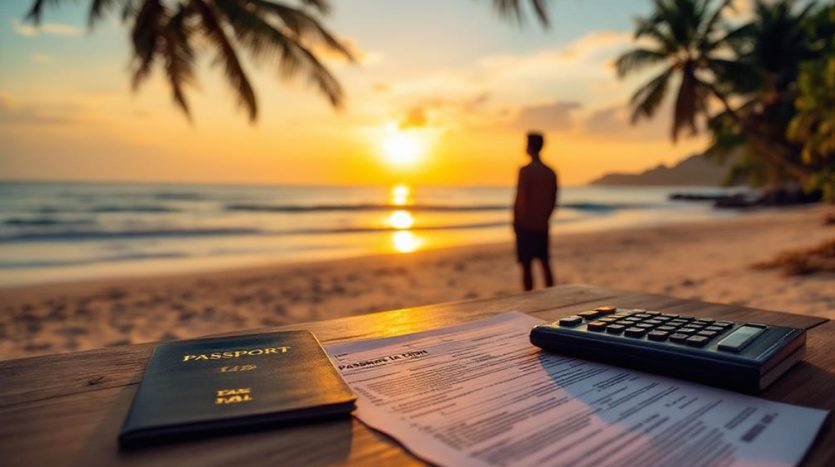Do I Have to Pay US Taxes if I Live in Thailand?
Living in Thailand might feel like a world away from your responsibilities back home, but as a U.S. citizen, your obligation to pay taxes doesn't simply vanish. You're expected to report your worldwide income, regardless of where you reside. However, you might be eligible for some tax benefits like the Foreign Earned Income Exclusion or the Foreign Tax Credit to ease the burden. Curious about how these work and how you can stay compliant without overpaying? There's more to explore, especially if you want to make the most of living abroad without tax headaches.
Key Takeaways
- U.S. citizens living in Thailand must report global income and file annual IRS tax returns.
- The Foreign Earned Income Exclusion can reduce taxable income for U.S. expats in Thailand.
- The Foreign Tax Credit offsets taxes paid to Thailand, minimizing double taxation.
- Reporting foreign bank accounts exceeding $10,000 is mandatory using FinCEN Form 114 (FBAR).
- Consulting a tax professional is advisable for complying with complex U.S. tax regulations abroad.
Understanding U.S. Tax Residency

Understanding U.S. tax residency is essential for citizens living abroad, such as those residing in Thailand. You might think sipping coconuts under the sun exempts you from Uncle Sam's watchful eye, but alas, the tax residency rules say otherwise.
U.S. tax law follows the principle of citizenship-based taxation, meaning if you're a U.S. citizen, you're likely still on the hook for taxes, regardless of your current tropical locale. Even when exploring diverse options for living arrangements in Thailand, from beachfront bungalows to city apartments, tax obligations remain a part of the expat experience.
To determine your tax residency status, you'll need to navigate the maze of legal tests. The substantial presence test evaluates your days spent in the U.S., while the green card test determines residency based on immigration status.
Fail these, and congratulations, you're a tax resident! This isn't just a snazzy title—it comes with expat tax implications, like the joyous task of filing annual returns with the IRS.
But fear not, understanding these rules can prevent unexpected tax bills that could rival your monthly pad thai budget.
Worldwide Income Taxation
Worldwide income taxation is a fundamental principle of U.S. tax law that impacts every American living overseas, including those in Thailand. This principle means you must report your global income to Uncle Sam, regardless of where you hang your hammock.
Whether you receive income from a Thai job or dividends from a U.S. stock, your expat obligations require you to disclose it all. While living in Thailand, you might find affordable housing options, especially in rural areas where properties can cost between 1-3 million baht.
Now, you might think, "But I'm soaking up the sun in Thailand, why should I pay U.S. taxes?" Well, residency rules dictate that as a U.S. citizen, your tax implications follow you like a shadow. You're not just sipping coconut water on the beach; you're also steering through international taxation waters, which can be as complicated as a Bangkok traffic jam.
Your income sources could range from wages to rental income, and each has its own reporting requirements. It's crucial to understand these to avoid compliance challenges.
Forgetting to report could lead to penalties, and let's face it, nobody wants an IRS letter ruining their paradise. So, embrace the expat life but remember your tax duties. After all, nothing says "American abroad" like filing taxes from under a palm tree.
Filing Requirements for Expats

As a U.S. citizen living in Thailand, you're subject to specific filing requirements based on your worldwide income.
It's crucial to recognize that while living in Thailand, you can benefit from the affordable healthcare and low-cost living conditions, which might help manage your overall expenses.
If your income exceeds certain thresholds, you must file a U.S. tax return, potentially utilizing the Foreign Earned Income Exclusion and applicable tax credits and deductions to mitigate your tax liability.
Understanding these provisions is essential to guarantee compliance and optimize your tax situation.
Income Thresholds for Expats
When living abroad in Thailand, it's essential for U.S. expats to be aware of the income thresholds that dictate their filing requirements with the IRS. Now, you might think, "I'm sipping coconuts on a beach, do I really have to worry about this?" Well, if your expat income hits certain levels, Uncle Sam wants his share. Here's the scoop: if your gross income exceeds the threshold for your filing status, you're legally obligated to file a U.S. tax return.
Here's a handy table that breaks it down:
| Filing Status | Age | Income Threshold (2023) |
|---|---|---|
| Single | Under 65 | $12,950 |
| Married Filing Jointly | Both under 65 | $25,900 |
| Head of Household | Under 65 | $19,400 |
| Married Filing Separately | Any age | $5 |
As you can see, the IRS has a keen eye for detail. Even if you're living the expat dream in Thailand, these numbers determine your tax obligations. So, unless you want to be the star of your own tax horror story, it's vital to keep tabs on your earnings. Remember, ignoring these thresholds won't make them disappear—no matter how far you are from the IRS headquarters!
Foreign Earned Income Exclusion
Steering through the Foreign Earned Income Exclusion (FEIE) is essential for U.S. expats in Thailand aiming to reduce their tax liabilities.
Imagine sipping a coconut on a Thai beach while dodging Uncle Sam's tax grab. Sounds idyllic, right? Here's the scoop: the FEIE allows you to exclude a significant chunk of your foreign income from U.S. taxation, provided you meet certain foreign income eligibility criteria.
Now, let's get into the nitty-gritty. To qualify for this expat tax benefit, you must pass either the Bona Fide Residence Test or the Physical Presence Test.
The former requires you to establish residency in Thailand for an entire tax year, while the latter demands your physical presence in a foreign country for 330 days within a 12-month period. It's like a tax-themed game of hide and seek—except you're hiding from taxes, not toddlers.
Once you clear these hurdles, the expat tax benefits kick in, allowing you to exclude up to $108,700 (as of 2021) of foreign earned income.
Tax Credits and Deductions
While excluding foreign income through the FEIE offers significant relief, you shouldn't overlook the tax credits and deductions available to U.S. expats in Thailand. As you navigate the maze of international taxation, these little gems can be the difference between stressing over a tax bill and breathing easy. Tax credits like the Foreign Tax Credit (FTC) allow you to offset taxes paid to Thailand against your U.S. tax liability. Meanwhile, eligible deductions can include mortgage interest and charitable contributions, if they sufficiently withstand scrutiny.
Understanding your tax residency status is essential for filing strategies that maximize expat benefits. You might think, "Oh, I live on a beach, I'm practically tax-free!"—but Uncle Sam has other ideas. Income exclusions only go so far; tax compliance remains mandatory.
Here's a quick table to tickle your funny bone (or make you cry):
| Scenario | Emotion | Action Required |
|---|---|---|
| Forgetting a tax credit | Panic | Amend your return |
| Finding an eligible deduction | Joy | File with precision |
| Misjudging tax residency | Confusion | Consult a tax pro |
| Mastering income exclusions | Triumph | Celebrate wisely |
Foreign Earned Income Exclusion
Steering through the complexities of the Foreign Earned Income Exclusion (FEIE) can greatly ease your tax burden while living in Thailand. Imagine FEIE as your trusty sidekick, helping you dodge double taxation on your foreign income sources.
To qualify, you must pass either the bona fide residence test or the physical presence test, which sounds like a superhero challenge but involves spending sufficient time abroad. These tests determine your tax residency implications, fundamentally proving you're not just sipping coconut water on holiday.
While living in Thailand, understanding tax obligations related to property investments can also be vital, as foreigners have specific financial considerations and tax implications they need to be aware of.
FEIE allows you to exclude a specific amount of your foreign earned income from U.S. taxation. In 2023, this amount caps at $120,000. Think of it as your financial force field against Uncle Sam's tax grip. If your income is below this threshold, you might escape the tax clutches completely. However, income above this will still be subject to U.S. taxes, unless you deploy other tax-saving strategies.
But beware, FEIE doesn't cover all types of income. Passive income like dividends or interest doesn't make the cut. So, while you might feel like a tax wizard avoiding some taxes, you're not completely off the hook. The IRS always has a way of keeping you on your toes.
Foreign Tax Credit Overview

As a U.S. citizen residing in Thailand, you're eligible to claim foreign tax credits, which can mitigate the financial burden of double taxation.
By utilizing these credits, you effectively reduce your U.S. tax liability for taxes paid to the Thai government.
This mechanism guarantees equitable treatment under international tax laws, allowing you to retain more of your income.
Claiming Tax Credits Abroad
Maneuvering the complexities of paying US taxes while living abroad, claiming a Foreign Tax Credit can greatly alleviate your tax burden.
It's like finding a loophole in the Matrix but without the sci-fi drama. As a US citizen in Thailand, you're obligated to report foreign income regardless of tax residency implications. Yes, Uncle Sam wants to know about your Thai baht escapades!
However, the IRS isn't completely heartless; you can claim a Foreign Tax Credit for taxes paid to Thailand, thereby reducing your US tax liability. This is where the magic happens.
To qualify, you must tackle foreign income considerations head-on. First, verify that the tax paid abroad is an income tax or a tax in lieu of income tax. Also, the tax must be a legal and actual liability to a foreign country. Think of it as your ticket to a less financially burdensome existence.
Don't forget the IRS Form 1116, your trusty sidekick in this tax adventure. While it may feel like you're deciphering ancient runes, it's essential for claiming your credit.
Reducing Double Taxation Impact
Understanding the Foreign Tax Credit is essential for reducing the impact of double taxation on your income. You're living in Thailand, sipping coconut water, and thinking, "Why am I paying Uncle Sam when I'm not even in the same hemisphere?" The Foreign Tax Credit (FTC) is your lifeline. It allows you to claim a credit for taxes paid to a foreign government, thereby minimizing your U.S. tax liability.
Here's how you can tackle this conundrum:
- Determine Tax Residency Implications: Establish whether you're a bona fide resident or meet the physical presence test. This affects your eligibility for FTC and other double taxation strategies.
- Calculate Eligible Taxes: Only foreign income taxes qualify. Property taxes in Phuket? Sorry, they don't count.
- File Form 1116: This form is your best friend. It calculates your FTC, ensuring you don't pay more than necessary.
- Strategize with Double Taxation: Consult a tax professional to optimize your FTC and align it with other credits and deductions.
Tax Treaties and Their Impact
Tax treaties play an essential role in determining your tax obligations when living abroad. The United States and Thailand haven't entered into a bilateral tax treaty, which leaves you in a bit of a tax limbo.
But don't worry, you're not alone in this bureaucratic ocean. The absence of a specific tax treaty means that the benefits typically associated with such agreements, like avoiding double taxation, aren't readily available.
However, you can still sail smoothly by understanding the residency implications.
Under U.S. tax law, your residency status determines your tax obligations. As a U.S. citizen or resident alien, you must report worldwide income, whether you're in bustling Bangkok or a serene Thai beach.
But before you panic about paying taxes twice, consider the foreign tax credit, a lifebuoy that helps offset taxes paid to foreign governments.
Reporting Foreign Bank Accounts

How do you guarantee compliance with U.S. regulations when it comes to reporting foreign bank accounts? Well, you're in for a bureaucratic joyride known as foreign account reporting.
To avoid tax penalties and navigate the labyrinth of FATCA compliance, here's your roadmap:
1. Identify Reporting Thresholds: If your offshore banking accounts exceed $10,000 at any point during the year, you're in the reporting zone. The IRS is like a hawk, watching for these thresholds.
2. File the FBAR: The FinCEN Form 114 is your ticket to expat banking compliance. Even if you're sipping coconut water in Thailand, this financial disclosure is non-negotiable.
3. Understand Account Classifications: Not all accounts are created equal. From savings to securities, these classifications determine your reporting obligations.
Don't let secrecy laws cloud your judgment.
4. Engage Financial Institutions: Reach out to your bank; they're well-versed in FATCA compliance. They'll help you navigate the notorious U.S. labyrinth, where ignorance isn't bliss but a potential legal drama.
Strategies for Tax Compliance
Strategizing for tax compliance while living abroad doesn't have to be a Herculean task. Sure, the IRS might feel like a mythical beast lurking in your financial shadows, but fear not! With diligent tax planning and robust compliance strategies, you can avoid any tax-related catastrophes.
First, consider the Foreign Earned Income Exclusion (FEIE). This nifty provision allows you to exclude a significant chunk of your foreign income from U.S. taxation, provided you meet certain criteria. It's like a magical cloak that makes some of your income disappear—legally, of course.
Next, keep meticulous records. You know, receipts, bank statements—anything to prove your financial innocence. The more documentation you have, the easier it's to defend your case if the IRS comes knocking. Plus, it adds a touch of mystery to your tax planning endeavors.
Don't forget to file your Foreign Bank Account Report (FBAR). It's not just a compliance strategy; it's your way of saying, "Hey, I'm not hiding anything in Swiss vaults!"
Consult a tax professional to navigate the labyrinth of forms and deadlines. After all, it's better to invest in expertise than pay the price of ignorance.








